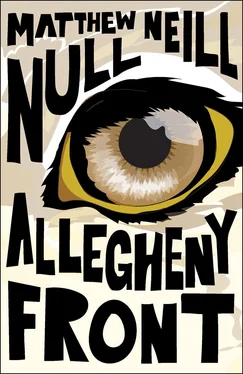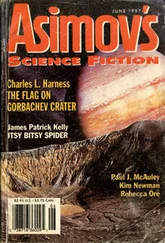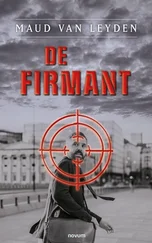“Hey now, settle down,” said Cartwright. “I ain’t casting aspersions.” He read the notice a third time, a grin swelling on his face. “We’ll split it sixty-forty,” he said. “But that’s a solid forty.”
No one had been to the cave much since the War, when a few dozen men harvested saltpeter for the Confederacy, and then for the Union when the militia told them they lived no longer in Old Virginia. They’d shrugged, saying, Makes no difference to us, we just want to eat. And avoid conscription, they might have added. When the War ended, their profits vanished and the cave was plunged back to obscurity. A scattering of people knew the place, but none knew it like McBride’s boys: they crawled into the Sinks of Gandy to harvest flint and hide from downpours when they hunted spring turkeys.
Toting a bundle of tools, the nine-fingered boy led Cartwright on cattle paths to skirt their few neighbors, suspicious people loyal to no one but blood and that even questionable. They wandered into high meadows drowning in beaver dams and dropped into the next valley. A thin jade river fled north and drained with a sucking roar into the Sinks of Gandy, a hatchet-wound that grinned in the mountainside. The Sinks led to a lacework of caverns that under-girded the farmlands. The river resurfaced three miles north-by-northwest.
Stubby stalactites drooped from the opening, and a hush issued from the hole, exhaling the smell of damp rock. Cartwright held out a hand and found it too mild for hell. He glanced over his shoulder at the humpy valley-land beckoning him back. “Two miles in,” the boy said, stuffing his belongings into a waterproof satchel made of stomach. “Long miles.”
They were swallowed into the cold bowels of the mountain. Cartwright cursed, sinking his leg into a sump of cave mud as the boy lit a pineknot from his satchel. The torch spat glow on soap-stone walls that glistened wetly as a dog’s mouth.
A frothy roar. Crotch-deep in the river, their flesh shriveled. All manner of beasts erupted from the crevices — blind wormy salamanders, hare-eared bats whose wings were silk fans brushing their faces. They scrambled over rocks and hangs as the river dropped and narrowed, sluicing through a trough. Deeper they went. Walls closed and they squeezed through closets of stone, rooms within rooms. Cartwright felt his chest cave, his ribs compress. Each breath painful, space no more than a corncrib. His lungs burned. He cried out, casting echoes through the tunnel.
“Quit your wailing,” the boy said, holding out his hand to the mud-smeared man who still wore a necktie. “Breathe deep. Scoot sideways.”
Cartwright popped free into a chapel of stone. The boy pulled a fresh pineknot from his bag, touched it off, and handed the hissing lantern to the drummer. The room soared overhead, massive wet ribbons of rock dripping in folds from the ceiling. The chemical burn of waste in his nostrils, a roof of rodents screeching above. In bygone days the men said, The bats sow shit and we reap gunpowder.
They came to an opening, a single slur of light on the floor. Cartwright stuck his head inside and drank the sweet air. Covered crown to boot in coffee-colored mud, he asked, “Won’t that fire choke us?”
The boy ran his four fingers over the remains of abandoned saltpeter hoppers pegged to the wall, troughs of cucumber wood and oak. “Big window up top lets the fire out. Indian smokehouse. Funny thing, you walk though the field and a flock of bats just pop out the ground beneath you. You near piss yourself.”
They felt the earth settle and creak, the animals shuddering in waves overhead. A few squeaking kits fell from the ceiling, and they couldn’t help but tromp them under boot.
“What if the whole mountain falls down?”
“Been standing since Genesis,” the boy said. “Look, here we are.”
The ground was a carpet of fossilized dung. With their torches, they studied the wall-scratchings of a lost people, charcoal men in positions of coupling and war. That’s when Cartwright saw the face glaring back at him. The maw of a cave bear jutted from the rock, trapped by flood long ago. The greasy pine fire burned against it with a contained fury, illuminating the hollows of its face. It was no middling circus bear, its skull gargantuan, with black canines dripping down the jaw. Cartwright couldn’t believe it. He put a hand to the wall, and soft shale flaked and fell away. He took the clipping from his shirt pocket and read it aloud, taking a second go at the longer words.
REPRESENTATIVE OF THE SMITHSONIAN INSTITUTE TO APPEAR AT ANTHEM CHAMBER OF COMMERCE — COMPENSATION FOR FOSSILS OF PREHISTORIC MEGAFAUNA. One of the state’s most famous visitors, Thomas Jefferson, found rare claw-bones of a giant three-toed sloth in the Organ Cave, on the old Nat Hinkle farm in Greenbrier County in 1792. Dr. Charles Lands Burke, a young scholar from Washington, D.C., seeks to follow in his footsteps and is looking to local landowners for aid with this government initiative — with generous compensation.
“Sounds right to me,” the boy said. Could the boy even have read it? Did someone explain it to him? He took a hammer and a chisel from his bag and handed them to Cartwright. Turning his shoulder so the boy couldn’t see, Cartwright folded the newspaper clipping back into the sucker list, marrying the two documents together, and tucked them into his jacket.
Stepping forward, Cartwright ran his thumb against the sharp ring of the occipital bone and the worn points of fang, tracing the fissures of the skull that rippled like stitches under his touch. It thrilled him. He couldn’t wait to turn it over in his hands. He was amazed there were such things in the ground, waiting to be dug out like potatoes. Cupping them in his brown palm, Cartwright’s father used to show off the arrowheads he tilled out of the fields.
The boy said, “Something, ain’t it?”
A scene came drifting up from the lakebed of memory. When Cartwright was seven years old, his father had bought a gold locket for his wife’s birthday from a drummer passing through. A smile they hadn’t seen before took hold of her face. A week later, his father stood clutching the doorframe, looking shamefully at where the false gold stained her pale skin like gangrene. He tore it from her neck and threw it down the well. It was the one time his father had cried in front of them. The frightened children fanned into the woods. That night, Cartwright’s father had to come looking for him with a lantern to fetch him back home.
Cartwright grooved the chisel’s tooth into the base of the skull, where the spine would fuse, and lifted the hammer. He let it fall. The chisel jumped in his hand and half the skull turned to silt. It cascaded down the rock wall with the faintest sigh. The boy let out a string of oaths so profane, so unparalleled, that surely they’d been inspired by a hell so near.
Cartwright was glad to have a hammer in hand.
Once again they waded the river, water sucking at their limbs. A pinprick of light appeared ahead. Neither spoke, even when a toothy rock tore Cartwright’s jacket with a startling rip. Soon, a delicate sun and then a javelin of light struck the drummer’s chest. They came to the mouth of the Sinks of Gandy. “I see them coming,” the boy said.
Indeed, McBride and the ten-fingered boy stood there with guns in hand, laughing, each with a fox draped over his shoulder. McBride held a double-barreled sixteen-gauge loaded with pumpkin-ball slugs, a gun the drummer hadn’t seen before. They lifted their bloody foxes to the sun. They were fresh, tongues still pink with the suggestion of life. The foxes couldn’t be eaten, only sold; like all predators, they reeked of the flesh they’d consumed. One was a black-socked vixen with a sleek coat, the other a gray fox, its face and limbs streaked with red, which had obviously been living in a briar patch. It could use a currycomb and wouldn’t bring as much, Cartwright mused miserably, but still a good price.
Читать дальше












